Port St. Lucie Addiction Treatment & Mental Health Resources Guide
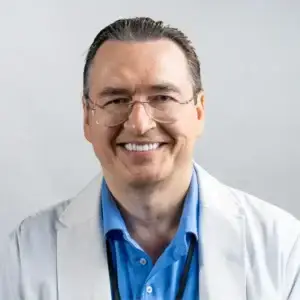
Dr. Rostislav Ignatov, MD
Chief Medical Officer
Port St. Lucie faces a complex addiction and mental health challenge, but residents have a growing network of crisis response, treatment, and recovery supports across the city and the Treasure Coast. Florida’s statewide overdose death rate declined from 35.2 (2022) to 31.7 (2023) per 100,000, reflecting expanded prevention and care.
Florida’s iSaveFL program has distributed 1.8M+ free naloxone kits with 62k+ reported reversals (Department-distributed naloxone, as of March 31, 2025), and locals can dial 211 to dispatch New Horizons’ Mobile Response Team anywhere in the city, 24/7.
This guide details exactly how to access addiction treatment and mental health services in each Port St. Lucie neighborhood and how programs like The Haven Detox – Florida provide safe, comprehensive care in a supportive setting for Port St. Lucie residents.
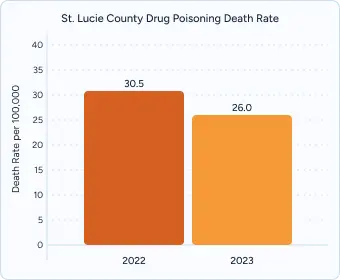
In St. Lucie County, the age‑adjusted drug poisoning death rate fell from 30.5 per 100,000 (2022) to 26.0 (2023). In 2023 there were 94 drug poisoning deaths among county residents (all intents). These are the most recent finalized county figures published by the Florida Department of Health.
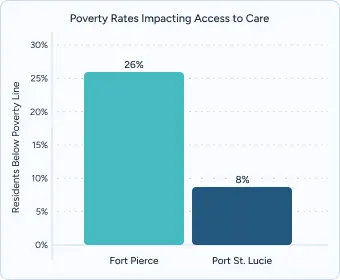
Addiction and mental health struggles aren’t spread evenly across our area. Some nearby neighborhoods—especially parts of Fort Pierce—face much higher economic hardship than most of Port St. Lucie, which can make care harder to reach. For example, about 26% of Fort Pierce residents live below the poverty line, compared with about 8% in Port St. Lucie. Offering more free naloxone, same-day appointments, and easier transit options can close these gaps.
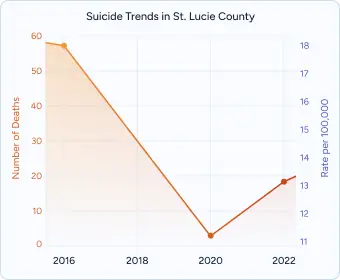
In 2015, St. Lucie County recorded 54 suicide deaths (18.05 per 100,000); in 2020, there were 40 (11.20 per 100,000); and in 2023, 58 (13.15 per 100,000). Even though the number of deaths in 2023 is higher than 2015, the rate per 100,000 is lower—suggesting a gradual reduction in per-resident risk over the decade. Rapid population growth can raise raw counts while rates fall, and expanded crisis supports, better screening in primary care, school-based supports, and community education about safe storage and seeking help may all be contributing.
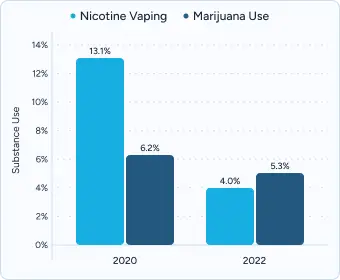
St. Lucie County youth surveys show changing behavioral-health patterns. Between 2020 and 2022, past-30-day substance use generally declined—for example, nicotine vaping fell from 13.1% to 4.0% and marijuana use from 6.2% to 5.3% among students in grades 6–12. Meanwhile, the share of students feeling depressed or sad most days peaked at 43.2% in 2022 before improving to 33.2% in 2024 (down from 41.3% in 2018).
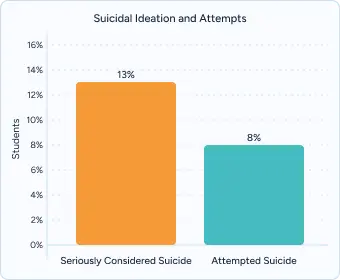
In 2024, about 13% of St. Lucie County middle and high school students reported seriously considering suicide, and 8% reported at least one suicide attempt, underscoring the urgent need for robust mental health supports. Note: 2024 estimates are survey-based; the county report shows a combined sample of 852 students and a maximum overall margin of error of about 4.7%.

Florida DCF’s Community Action Treatment Teams (CATT) serve as a centralized access point for treatment information and referrals. The program embeds substance use navigators in community health centers and offers telehealth assessments.
The St. Lucie County Mobile Response Team provides 24/7 crisis intervention countywide. Operating through the 211 helpline and dispatching to any location in Port St. Lucie, the team offers on-site psychiatric evaluations, brief stabilization services, and connection to follow-up care through the local health department.
Transportation accessibility through St. Lucie County Transit links all neighborhoods to Port St. Lucie drug rehab programs and mental health facilities. Route 1 connects Tradition and St. Lucie West to the health department campus; Routes 9 and 11 serve Midtown and Southbend; and the Paratransit service offers door-to-door transport for individuals with disabilities.
Florida Medicaid provides comprehensive addiction and mental health coverage. It covers 100% of treatment costs for qualified residents—including medical detox, residential treatment, outpatient therapy, and FDA-approved medications such as buprenorphine and naltrexone—and eliminated all substance use disorder copayments statewide in August 2023.
Florida Healthy Kids (CHIP) offers coverage for eligible children and teens, ensuring access to crisis intervention and mental health support. Enroll via the Florida Department of Health online portal. Applications are available in English and Spanish.
The Florida DCF’s State Opioid Response (SOR) program expands provider capacity for uninsured individuals through grant funding, supporting free or low-cost treatment slots—contact local treatment providers for availability rather than applying directly.
St. Lucie County Health Access Services coordinates care navigation for uninsured residents. Call 211 to connect with the county referral line to identify available treatment slots and receive personalized enrollment assistance.
Individuals seeking private treatment without lengthy wait times can access several Port St. Lucie–area facilities that offer direct admission alongside complimentary insurance verification services. These programs deliver thorough clinical assessments, medically supervised detox when necessary, and proven therapeutic modalities such as dialectical behavior therapy, EMDR processing, and medication-assisted treatment protocols.
Professional treatment facilities typically offer enhanced benefits compared to publicly funded alternatives:
Most facilities complete insurance verification within 48 hours and can arrange immediate placement when medically indicated and clinically appropriate.
The Haven Detox – Florida delivers prompt access to proven addiction and mental health treatment for South Florida and the wider region.
The center integrates evidence-based therapies such as CBT and DBT with holistic modalities including meditation, yoga, massage, and nutrition services. Advanced tools like GeneSight genetic testing and NAD+ IV therapy help personalize medication plans and support detoxification. With around-the-clock medical care, The Haven Detox offers medically supervised detox plus residential treatment in a calming, resort-style environment, featuring chef-prepared meals, modern rooms, fitness facilities, outdoor spaces and lounging areas.
The Haven Detox treats co-occurring mental health disorders alongside addiction, accepting most major insurance plans, with options for same-day admission. Dual-diagnosis care, aftercare support, and specialized programs are all part of a continuum of care.
Port St. Lucie mental health services extend across the community with specialized support for depression treatment, anxiety counseling, trauma recovery, and dual diagnosis care. Local providers emphasize evidence-based therapy combined with compassionate, individualized treatment. Culturally responsive care and bilingual services help ensure that residents from diverse backgrounds can access support that meets their needs.
Community-centered mental health resources strengthen access to care throughout Port St. Lucie and the surrounding Treasure Coast. Programs include outpatient counseling, group therapy, family support, and integrated treatment for co-occurring substance use and mental health concerns. With a focus on trauma-informed practices and holistic wellness, these services work to improve long-term recovery, resilience, and overall quality of life for individuals and families.
Port St. Lucie Recovery Center (centrally located in the city) provides free, peer-driven recovery support including life skills workshops, sober social activities, and recovery coaching. The center also fosters connection through community events and outreach initiatives that encourage long-term sobriety and wellness.
Treasure Coast Peer Support Network offers specialized groups for men, women, and families, addressing addiction, mental health, and co-occurring conditions with inclusive, culturally responsive programming. The facility is accessible and community-oriented, ensuring that support is available to individuals of all backgrounds through peer-led recovery models.
Neighborhood-based peer programs throughout Port St. Lucie and nearby communities expand access to recovery services. These programs provide safe spaces for individuals in recovery to share experiences, build support networks, and access guidance. Flexible hours during weekdays and weekends help meet the needs of working individuals and families.
FARR-certified sober homes offer structured, substance-free housing that follows national best practice standards set by the National Alliance for Recovery Residences (NARR). The Florida Association of Recovery Residences (FARR) maintains a statewide directory at farronline.org with independently reviewed, certified homes serving Port St. Lucie and the broader Treasure Coast.
Local sober living residences typically provide on-site house managers, curfews, peer accountability, and amenities such as Wi-Fi, laundry, and parking. Residents agree to community guidelines—maintaining sobriety, participating in recovery meetings or counseling, completing house responsibilities, and completing regular alcohol/drug screenings—to support a safe, recovery-focused living environment.
St. Lucie Intergroup AA meetings maintain a regularly updated schedule of in-person and online AA gatherings in Port St. Lucie and the surrounding Treasure Coast. Multiple meeting types are available, including open and closed sessions, speaker-led discussions, newcomer-friendly groups, and specialty groups (e.g. for women, men, etc.).
Spanish-language AA meetings are held in Port St. Lucie, such as Grupo Serenedad, ensuring Spanish-speakers have dedicated options in the region.
A quality program starts with a thorough evaluation of substance use, mental health, medical history, and recovery goals. This allows for integrated dual-diagnosis care, trauma-informed practices that emphasize safety and choice, and a clear plan that involves family when appropriate.
Treatment should pair medical care with approaches shown to work. In Port St. Lucie, strong programs commonly use:
Effective care includes access to medications for opioid and alcohol use disorders—such as buprenorphine, extended-release naltrexone (Vivitrol), acamprosate, and methadone (via certified OTPs)—always combined with counseling and ongoing monitoring.
Look for programs that offer 24/7 medically supervised detox when needed, step-down care (residential or outpatient), case management, coordinated aftercare, and practical supports like family education, nutrition guidance, and relapse-prevention planning.
Port St. Lucie’s diverse community benefits from bilingual services and interpretation, respectful LGBTQ+-affirming care, and veteran/first-responder–aware programming. Accessibility features and help with transportation further reduce barriers so people can focus on healing.
Aftercare Coordination should begin during active treatment and include linkage to outpatient therapy, peer support organizations like AA/NA, and FARR-certified sober living facilities. Programs should provide warm handoffs to community providers, ongoing case management support, and partnerships with local recovery community organizations for sustained engagement.
Family Engagement and Support improves treatment outcomes through multi-family therapy sessions, educational workshops about addiction and mental health, and support groups for affected family members. Look for programs offering Spanish-language family services, Al-Anon connections, and cultural adaptations for diverse family structures throughout St. Lucie County.
Leading programs in Port St. Lucie utilize a variety of evidence-based approaches, ensuring care is tailored to each client’s unique needs. Modalities often include cognitive-behavioral therapy (CBT), dialectical behavior therapy (DBT), trauma-focused counseling, and motivational interviewing to strengthen long-term recovery outcomes.
Professional treatment represents an investment in recovery success, offering immediate access, personalized care, and comprehensive services designed to address the complex nature of addiction and mental health conditions.
Insurance and Financial Verification includes comprehensive benefits review within 48 hours, cost estimation assistance for both covered and self-pay options, providing clear financial information to eliminate barriers to accessing needed treatment services.
Assessment and Intake Services offer same-day clinical evaluations when appropriate, next-day placement coordination with minimal delays, and streamlined admission processes that prioritize clinical readiness and individual treatment needs while supporting informed decision-making.
If anyone is in immediate danger, call 911. For 24/7 confidential support with suicidal thoughts, mental health, or substance use crises, call or text 988 (Suicide & Crisis Lifeline) or chat online.
Care typically ranges from medically supervised detox to residential/inpatient, followed by outpatient and aftercare. The best fit is based on a clinical assessment, safety needs, and support at home.
The Haven Detox—Florida (nearby in West Palm Beach) provides 24/7 medical detox, residential treatment, dual-diagnosis support, and coordinated aftercare. Our admissions team can discuss options and next steps
We offer confidential benefits verification and explain deductibles, authorizations, and any out-of-pocket costs before admission.
Yes. The Haven Detox—Florida provides bilingual support and interpretation upon request so care is accessible and comfortable.
Many patients use local public transit, rideshare, or trusted family/friends. Our team can help plan transportation for admission and discharge, and coordinate options when available.
Yes—there are regular in-person and online AA and NA meetings across the city. The Meeting Guide app (for AA) and NA’s national tools list times and locations; check the day-of as schedules can change.
Yes. If it’s clinically appropriate, your care team can share vetted recovery housing options and help coordinate a safe transition that supports your discharge plan.
Length depends on substance type, duration of use, health history, and how you respond to medications. Many detox stays last several days; we personalize timelines for safety and comfort.
Depending on your needs, care may include evidence-based therapies (CBT/DBT skills, Motivational Interviewing), medication-assisted treatment when appropriate, relapse-prevention planning, and family education.
Often, yes. With your permission, we include family education or therapy to support healing at home and strengthen recovery after discharge.
We offer rapid admissions—often same day—based on clinical screening and bed availability. Call us to review your needs and timing.
24/7 Support
No Commitment
100% Private
There’s no catch. Checking your insurance is simply a way to see what your plan covers — it doesn’t lock you into treatment, notify anyone, or cost you anything. You get answers upfront to decide what makes sense for you.
Protecting your privacy matters! No information or notifications are ever sent to your employer or family — whether you check your insurance online or call. Everything is handled through secure, encrypted systems that meet strict medical privacy laws. You stay in control of your information!
Luckily, most insurance policies cover treatment here. Depending on the healthcare you’ve already had this year, costs could even be zero. Instead of worrying, let’s just find out what your plan covers.
Most likely. We work with major providers like Cigna, Aetna, and United Healthcare, public insurances like Tricare and tribal plans, and even smaller plans like Surest Bind and Harvard Pilgrim. The quickest way to know for sure is to check online or call. It’s a quick, private way to understand what is covered upfront.
Verifying your insurance isn’t a commitment to start treatment — it’s simply a way to see what your options are. Knowing your coverage ahead of time helps you make more informed, confident decisions. It also helps flag a spot, so you’re able to get right in if you ever do decide you’re ready.
You need your policy number to check your specific policy online. If you want general information, just call. You likely have questions beyond insurance anyway. Reaching out now helps you figure out the right fit if or when you’re ready. You don’t have to put off the call until you’re in crisis. Calling is not scary, I promise!